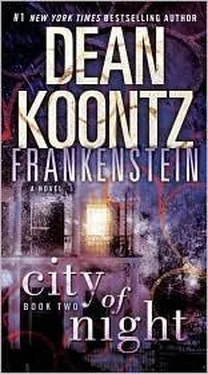Again, Christine’s words were spoken with a curious inflection, suggesting that she meant something more than what she said.
“I… I don’t understand,” Erika said.
“You will. When you’ve been alive long enough.”
Still struggling to comprehend, she said, “When you called my husband to report that William was biting off his forgers, you said, ‘We’ve got another Margaret.’ What did you mean by that?”
Rinsing a plate, carefully placing it in the drying rack, Christine said, “Until a few weeks ago, Margaret served as the household chef. She’d been here almost twenty years, like William. After an… episode… she had to be removed. A new Margaret is being prepared.”
“What episode?”
“One morning as she was about to make pancakes, she began to smash her face into the hot, greased griddle.”
“Smash her face?”
“Over and over again, rhythmically. Each time she raised her face from the griddle, Margaret said time , and before she slammed it down again, she repeated that word. Time, time, time, time, time — with much the same urgency that you heard William say tick, tock, tick, tock .”
“How mystifying,” said Erika.
“It won’t be… when you’ve lived long enough.”
Frustrated, Erika said, “Speak plainly to me, Christine.”
“Plainly, Mrs. Helios?”
“So I’m fresh out of the tank and hopelessly naive — so educate me. All right? Help me understand.”
“But you’ve had direct-to-brain data downloading. What more could you need?”
“ Christine , I’m not your enemy.”
Turning away from the sink, blotting her hands on a dish towel, Christine said, “I know you’re not, Mrs. Helios. And you’re not my friend, either. Friendship is akin to love, and love is dangerous. Love distracts the worker from maximum accomplishment, just as does hate. None of the New Race is a friend or enemy of the other.”
“I… I don’t have that attitude in my program.”
“It’s not in the program, Mrs. Helios. It’s the natural result of the program. We are all workers of identical value. Workers in a great cause, subduing all of nature, building the perfect society, utopia — then onward to the stars. Our value isn’t in individual accomplishments, but in our accomplishments as a society. Isn’t that correct?”
“Is it?”
“Unlike us, Mrs. Helios, you have been allowed humility, and shame, because our maker likes those qualities in a wife.”
Erika sensed a revelation coming from which she wished to turn away. But she, not Christine, had insisted on opening this door.
“Emotions are funny things, Mrs. Helios. Maybe it’s better, after all, to be limited to only envy and anger and fear and hate — because those feelings are circular. They turn endlessly back on themselves, like a snake swallowing its tail. They lead to nothing else, and they keep the mind from hope, which is essential when hope will never be fulfilled.”
Shaken by the bleakness in Christine’s voice and in her eyes, Erika was overcome with sympathy for the housekeeper. She put a hand consolingly on the woman’s shoulder.
“But humility and shame,” Christine continued, “can grow into pity, whether he wants you to feel pity or not. Pity to compassion. Compassion to regret. And so much else. You will be able to feel more than we feel, Mrs. Helios. You will learn to hope.”
A heaviness came into Erika’s heart, an oppressive weight, but she could not yet grasp its nature.
“Being able to hope — that will be terrible for you, Mrs. Helios, because your destiny is fundamentally the same as ours. You have no free will. Your hope will never be realized.”
“But William… How does this explain William?”
“Time, Mrs. Helios. Time, time, tick, tock, tick, tock. These disease-resistant, amazing bodies we possess — how long have we been told they will last?”
“Perhaps a thousand years,” Erika said, for that was the figure in the self-awareness package of her downloaded education.
Christine shook her head. “Hopelessness can be endured… but not for a thousand years. For William, for Margaret-twenty years. And then they experienced an… interruption of function.”
The housekeeper’s hard shoulder had not softened under her mistress’s touch. Erika withdrew her hand.
“But when you have the capacity for hope, Mrs. Helios, yet know beyond all doubt that it will never be fulfilled, I don’t think you can make even twenty years. I don’t think you can make five.”
Erika swept the kitchen with her gaze. She looked at the soapy water in the sink. At the dishes in the drying rack. At Christine’s hands. At last, she met Christine’s eyes again.
She said, “I’m so sorry for you.”
“I know,” Christine said. “But I feel nothing whatsoever for you, Mrs. Helios. And neither will any of the others. Which means you are… uniquely alone.”
The Other Ella, a restaurant and bar in the neighborhood known as Faubourg Marigny, an area now as funky and soulful as the French Quarter had once been, was owned and operated by a woman named Ella Fitzgerald. She was not the famous singer. She was a former hooker and madam who had wisely saved and invested the wages of the flesh.
As Aubrey Picou had instructed, Carson and Michael asked the bartender to see Godot.
An elderly woman put down the beer she was nursing, swiveled on her barstool, and took their picture with her cell phone.
Annoyed, Carson said, “Hey, Granny, I’m not a tourist site.”
“Screw you,” the woman said. “If I knew for sure a tour carriage was nearby, I’d run you into the street and shove your head up a mule’s ass.”
“You want to see Godot,” the bartender explained, “you go through Francine here.”
“You mean less to me,” the old woman assured Carson, “than the dinner I vomited up last night.”
As she transmitted the picture to someone, Francine grinned at Michael. She had borrowed her teeth from the Swamp Thing.
“Carson, remember when you looked in the mirror this morning and didn’t like what you saw?”
She said, “Suddenly I feel pretty.”
“All my life,” Francine told Carson, “I’ve known perky-tit types like you, and not one of you bitches ever had a brain bigger than a chickpea.”
“Well, there you’re woefully wrong,” Michael told her. “On a bet, my friend had an MRI scan of her brain, and it’s as big as a walnut.”
Francine gave him another broken yellow smile. “You’re a real cutie. I could just eat you up.”
“I’m flattered,” he said.
“Remember what happened to her dinner last night,” Carson reminded him.
Francine put down her cell phone. From the bar, she picked up a BlackBerry, on which she was receiving a text message, evidently in response to the photo.
Michael said, “You’re a total telecom babe, Francine, fully swimming in the info stream.”
“You’ve got a nice tight butt,” Francine said. She put down the BlackBerry, swiveled off her stool, and said, “Come with me, cutie. You too, bitch.”
Michael followed the old woman, glanced back at Carson, and said, “Come on, bitch, this’ll be fun.”
To assist with the tracking and the eventual efficient execution of Detectives O’Connor and Maddison, one of Victor’s people — Dooley Snopes — had fixed a magnetic-hold transponder to the engine block of their department sedan, tapping the battery cable for power, while the car was parked in front of O’Connor’s house, and while she had slept unaware through the summer morning.
Читать дальше












